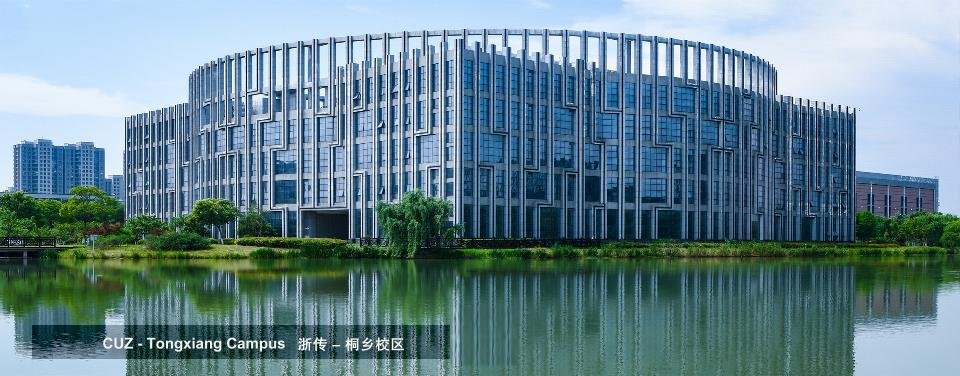𝒀𝒐𝒖𝒓 𝑮𝒂𝒕𝒆𝒘𝒂𝒚 𝒕𝒐 𝑮𝒍𝒐𝒃𝒂𝒍 𝑳𝒆𝒂𝒓𝒏𝒊𝒏𝒈

About of University
📖 Introduction
Communication University of Zhejiang, also known as
Zhejiang University of Media and Communications (ZUMC), is a public national
university in Hangzhou, China.
Communication University of Zhejiang, jointly established and jointly
administered by the State Administration of Radio, Film & Television and
People’s Government of Zhejiang Province, is a higher learning institution that
trains personnel in radio, film and other forms of media. Currently there are
two main bases in China training personnel in radio, film and other forms of
media, and there has been the saying “Communication University of China in the
north, Communication University of Zhejiang in the south”. Since its
establishment, CUZ has made great contributions in training a large number of
professionals for TV stations and radio stations at the state, provincial,
autonomous region, city and county level as well as other film and television
production units.
CUZ currently has 2 teaching departments, i.e., Department of Social
Sciences and Humanities and Department of Physical Education, and 9 colleges,
i.e., School of Journalism and Cultural Communication, School of Film &
Television Art, School of Electronics and Information Engineering, School of
Animation, School of Announcing & Anchoring Art, School of Management,
School of International Cultures & Communication, School of Music, School
of Continuing Education. It has 28 undergraduate programs including Radio and
Television Journalism, Announcing and Anchoring Art, Radio and Television
Directing, Radio and Television Engineering, etc. and a number of programs for
students at the junior college level. With the approval of the Education
Department of Zhejiang Province, CUZ started a “3+2” program of upgrading
graduates from junior colleges to undergraduate level, which enrols outstanding
graduates from junior or vocational colleges in Zhejiang province and charges
tuition fees according to public school standards, with two-year schooling.
Students in this program will be issued a full-time regular undergraduate
diploma after graduation and enjoy the same status as graduates from regular
universities in China.
🏛️ About Communication University of Zhejiang (CUZ)
Communication University of Zhejiang
(CUZ) is a high-level media university with distinctive
industry characteristics, co-funded by the Zhejiang Provincial People's
Government and the National Radio and Television Administration. On
September 8, 2004, President Xi Jinping, the then Secretary of Zhejiang
Provincial Party Committee, inspected the University and proposed the
earnest hope of "keeping up with the times and highlighting the
characteristics".
CUZ is a high-level
media university with distinctive broadcast industrial
characteristics, which was jointly established by Zhejiang Provincial People's
Government and the State Administration of Radio and Television (SARFT). on
September 8, 2004, Comrade Xi Jinping, the then Secretary of the
Party Committee of Zhejiang Province, visited CUZ and put forward his
earnest hope of "keeping abreast of the times and highlighting the special
characteristics". Its former Zhejiang Radio and Television
School founded in 1978 and Zhejiang Radio and Television College founded in
1984 were merged to form the new Zhejiang Radio and Television Higher College
in 2000, which was upgraded to Zhejiang University of Media and
Communication (ZUMC) in 2004 and later the current CUZ, and was
approved as a master's degree-granting unit in 2021. It has been honored with
the titles of National Party Member Education and Training Demonstration Base
and National Graduate Employment Typical Experienced Colleges and Universities.
The university has two
campuses in Qiantang, Hangzhou and Wuzhen, Tongxiang, covering an area of
1355.14 acres. It has 14 schools and colleges
( and departments), more than 13,300 undergraduate students, nearly
1,000 graduate students, more than 400 international students, and more than
1,400 teaching staff, including more than 150 national, provincial and
ministerial-level talents and high-end talents in the industry.
The university covers six
disciplines, including arts, literature, engineering, management, economics and
education. Theatre and Film and Television, Journalism and Communication are
the first-class disciplines in the province (Class A), while Information and
Communication Engineering and Public Administration are the first-class
disciplines in the province (Class B), and there are three professional degree
authorization points for the Master of Journalism and Communication, the Master
of Drama and Film and Television, and the Master of International Chinese
Education. There are 37 undergraduate majors, among which 13 majors such as
Radio and Television Studies are national first-class major construction
points, and 10 majors such as Network and New Media are provincial first-class
major construction points.
There are 3 national
teaching platforms such as National Animation Teaching and Research Base and
National Experimental Teaching Demonstration Centre for Television Editing and
Guiding, 11 provincial teaching platforms such as Provincial Experimental
Teaching Demonstration Centre, 4 provincial teaching teams, 2 modern industrial
colleges under provincial support, 12 first-class courses at the national level
and 177 first-class courses at the provincial level. There is the first 5G+4K
gaming comprehensive laboratory in domestic universities, 1 provincial key
laboratory, 1 provincial engineering research center, and 1 provincial
ministerial laboratory. There are more than 400 industry-university-research
practice and teaching bases, including 1 national off-campus practice and
education base for college students, 10 provincial off-campus practice and
education bases for college students, and 5 overseas internship bases.
There are 12 provincial
and ministerial-level science and innovation platforms such as China Radio and
Television Art Data Research Centre and Zhejiang Institute of Social Governance
and Communication Innovation, etc. In the past five years, the university has
been granted more than 100 national scientific research and creation projects,
including 9 major key projects, and more than 100 governmental reports have
been approved by leaders above the provincial and ministerial levels, and the university
has been granted the Ministry of Education's Outstanding Achievement Award in
Humanities and Social Sciences, the Provincial Scientific and Technological
Progress Prize, and the Provincial "Five Firsts Project" Award. He
has won more than 60 awards, including the "Five One Project" Award,
and 9 monographs have won the Outstanding Achievement Award in Philosophy and
Social Science of Zhejiang Province. The university has created or participated
in the creation of a large number of literary and audio-visual masterpieces,
such as the movie "Changjin Lake", "Wandering Earth 2", the
TV series "Age of Awakening", "Glory and Dreams",
"Little Happiness", the documentary "Sentiment",
"Going Home", "No. 31 Lushan Road", and the animation
"Chickens Rainbow". The documentary "Hand in Hand, for the
People" appeared at the summit meeting between the Communist Party of
China (CPC) and leaders of political parties in the world.
The university has
established cooperation and exchange relations with more than 150 universities
or institutions in more than 40 countries and regions in five continents, and
cooperates with Victoria University of Wellington in New Zealand and the
University of Bolton in the United Kingdom in organizing undergraduate and
master's degree Chinese-foreign cooperative education programs. The university
is a unit of the EU Erasmus program, an international humanities exchange and
media talent cultivation base of the Ministry of Education, a unit of the
Student Exchange Program of Chinese and Foreign High-level Universities of the
Ministry of Education, and a unit of the Teacher-Student Exchange Program
between Hong Kong, Macao, and Mainland Universities, and a unit of the
Innovative Talent International Cooperation Cultivation Program of the
Scholarship Council of China, and the Talent Support Program for Country and
Regional Studies of the Ministry of Education. It is the implementation unit of
the project of the National Scholarship Council's innovative talents
international cooperation and training program and the country regional
research talents support program, and it is the institution of the Hong Kong
Diploma of Secondary Education Examination Enrollment Program of the Hong Kong,
Macao and Taiwan Affairs Office of the Ministry of Education, as well as the
base of exchanges with Taiwan and the platform of entrepreneurship and
innovation for Taiwan youth in Zhejiang universities.
The university adheres to
the fundamental task of promoting moral education, promotes the diversified
integration of industry, academia and research, and makes great efforts to
cultivate new media talents with all-round development in morality,
intelligence, physical fitness, aesthetics and labor who can take up the great
responsibility of national rejuvenation. The quality of talent cultivation is
well recognized by all walks of life, and many graduates have become key elites
in the fields of news propaganda, film and television publishing, and cultural
industry, etc. More than 100 of them have been awarded the highest prizes in
the industry such as Yangtze River Taofen Prize, Golden Microphone Prize, and
Golden Voice Prize. The school is the demonstration base of "Mass
Entrepreneurship and Mass Innovation" in Zhejiang Province, and there is a
highly influential media culture and creative industry park in the province,
and the entrepreneurship rate of graduates one year after graduation ranks the
forefront of colleges and universities in the province.
Programs
Accommodation
🏠
You will need to book the accommodation after you have been accepted.
You can choose to live on campus or off campus in private accommodation.
How to book:
- Make a booking online after you have been accepted (in this case please let us know your choice when you apply).
- Register when you arrive - its not possible to reserve a room before arriving. You can arrive a few days before and book it.
Accommodation Fee: 5400RMB Per Year (four
Sharing Room)
Hostel
Fee: Free (Scholarship only)
Admissions Process
🔔
3 Steps to Apply to a Chinese
University
Required documents for application:
- Passport
- Graduation certificate
- Passport size photo
Preparing documents:
You can start your application now and send the application documents during your application. Some documents you can send later if you don’t have them right away.
Scholarship:
CGPA Requirement 3.00(75%)
Tuition Fee: Free
Meet Your Consultant


